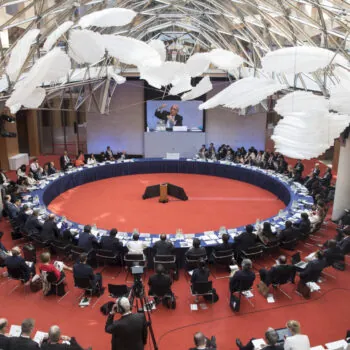Tony Blair was the first major head of government to bring climate change to the top of the international political agenda at the Gleneagles G8 Summit in 2005.
As we approach this year’s G8 meeting in L’Aquila, Italy from July 8th to 10th, he will continuing his work with world leaders to achieve consensus on a new and comprehensive international climate policy framework.
Entitled ‘Technology for a Low Carbon Future’, this report has been prepared by E3G’s Shane Tomlinson as part of the ‘Breaking the Climate Deadlock’ initiative with The Office of Tony Blair and The Climate Group. The report draws on and builds on E3G’s research culminating in the Innovation and Technology Transfer report.
Technology for a Low Carbon Future
Official Press Release by The Office of Tony Blair
Tony Blair will today call for immediate action on energy efficiency and a definitive commitment to develop the next generation of the technological revolution needed to get the world started down the low-carbon path.
The ‘Technology for a Low Carbon Future’ report comes just days before President Obama chairs a meeting of the major economies to discuss progress towards a new global climate agreement at Copenhagen later this year. The report finds that 70% of the reductions needed by 2020 can be achieved by investing in energy efficiency – lighting, vehicles, buildings and motors – and reducing deforestation.
The report concludes that the strategy that should be adopted at the MEF and into Copenhagen should be to focus on existing energy efficiency and renewable energy technologies, along with efforts to halt deforestation, which can deliver major short-term cuts in emissions, while we invest in next generation technologies – carbon capture and storage, new approaches to nuclear and solar, and emerging biotech based solutions – that will drive down emissions through to the middle of the century.
Tony Blair said: “Just as investing in electrification, railways and the internet led to economic growth in the past, investing in clean energy can help reignite the global economy now.”
The main report findings are:
- Major emission reductions are achievable by 2020 if we focus action on certain key solutions now;
- Fully 70% of the reductions needed by 2020 can be achieved by investing in energy efficiency – lighting, vehicles, buildings and motors – and reducing deforestation, the costs of which are manageable and generate positive returns;
- Just seven known policies that are already being successfully implemented in different parts of the world can deliver these reductions: they just need scaling up;
- We need to invest now in the development of those future technologies that will take time to mature, in particular carbon capture and storage (CCS), large scale solar and new generation nuclear, along with public infrastructure such as smart grids;
- International cooperation spurred by an ambitious agreement in Copenhagen can rapidly bring costs down and accelerate scale up of both current and future technologies.
Tony Blair said: “This report shows how major reductions even by 2020 are achievable if we focus action on certain key technologies, deploy policies that have been proven to work, and invest now for the development of those future technologies that will take time to mature.
“And these technologies bring economic and social opportunities too. Just as investing in electrification, railways and the internet led to economic growth in the past, investing in clean energy can help reignite the global economy now.


